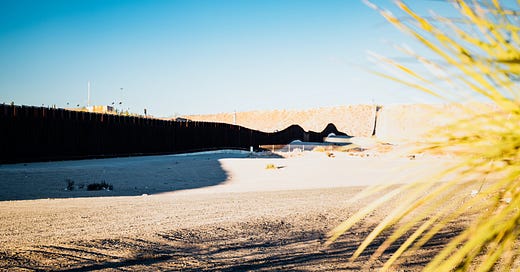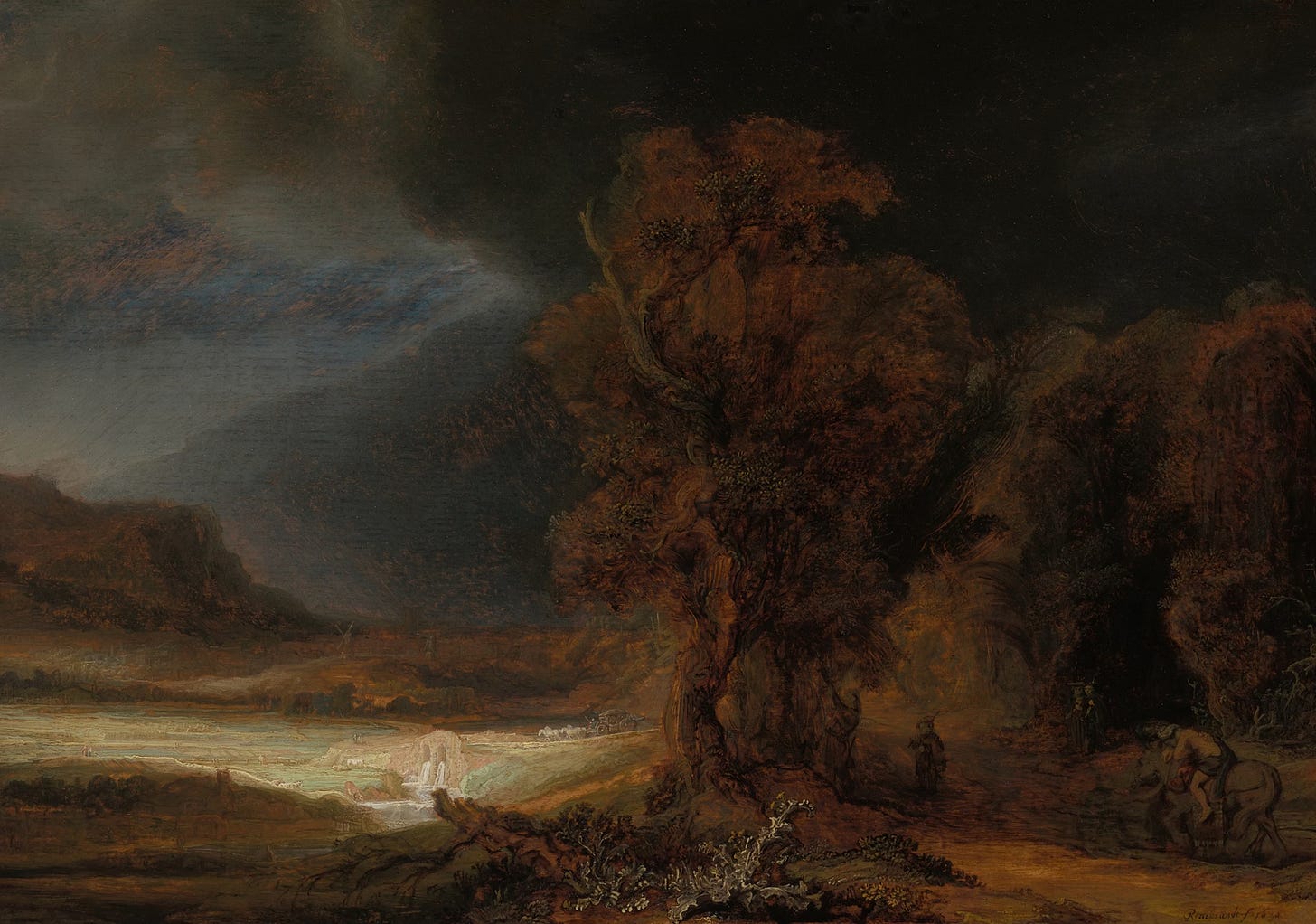“And Who Is My Neighbor?”
A Conversation with Rev. Dr. Jay Augustine on Immigration & Christian Character
“When a stranger sojourns with you in your land, you shall not do him wrong. You shall treat the stranger who sojourns with you as the native among you, and you shall love him as yourself, for you were strangers in the land of Egypt: I am the Lord your God.”
(Leviticus 19:33-34)
“The border is transient. The border is dangerous. The border is crass.”
(William Langewiesche)
On January 22, 2024, the U.S. Supreme Court moved to vacate an injunction issued by the Fifth Circuit in a case involving razor wires installed by Texas in order to stem the flood of migrants entering the state. Until then, at least three migrants—a woman and two children—have drowned near the disputed area, signaling understandably the need for quick action by border agents to render medical relief if they sense a medical emergency. Looking at this issue from the Texas side, public officials contend that their efforts to install the fencing along the Rio Grande River is part and parcel an effort to not only “deter illegal border crossings,” but also combat the influx of “deadly fentanyl,” human trafficking, and “minimize the risks to people, both U.S. citizens and migrants, of drowning while making perilous journeys to and through illegal points of entry.”
Whatever the political rhetoric became on both sides about Texas “going to war” with the Feds or defying the Supreme Court’s order (listen to the legal side here), what should be of primary concern to Christians is the safety and well-being of their neighbors—whether at home or abroad. Yes, the political rhetoric feeds into the election cycle becoming increasingly important as November draws near. And, of course, it remains important to respect the opinion of the nation’s highest court, as well as wrestle with the complicated constitutional concerns relating to, e.g., the anti-commandeering doctrine and questions relating to homeland security. But, for me, my family in Houston and my friends who work along the border in El Paso and Juárez (read their story here) is of primary concern.
And with my concerns come the imperative to manifest my faith in the challenges of everyday struggles that so often find two unbridgeable dilemmas demanding that we choose, in the words of Reinhold Niebuhr, the lesser of the two evils. This means that we must search the scriptures and pray with earnest zeal that God would help attune our eyes to see the need and act accordingly. Not merely to address the single issues, but also, in the words of Martin Luther King Jr., to cast a reparative vision for the restoration of the fallen and the lame: “to see that the whole Jericho Road . . . be transformed so that men and women will not be constantly beaten and robbed as they make their journey on life’s highway.”[1]
This task begins with at least two primary challenges. One is to correctly answer the question that was posed to Jesus Christ by the expert on the law in Luke 10:29—“And who is my neighbor?” And the second is to develop the requisite disposition toward addressing the need once the need has been identified: “But a Samaritan, as he traveled, came where the man was; and when he saw him, he took pity on him” (Luke 10:33). The type of disposition that reflects what Matthew Soerens and Jenny Yang call “a strong bias toward generosity.”[2] That is not a disposition that breeds overnight. It is the product of fruit wedded to a labor of sanctification. It is a difficult work that constantly comes to blows with the nature of our fallen selves. But at the same time, this does not mean we ignore the gravity of sin that men demonstrate most acutely in the forms of cartels who smuggle in children, weapons, and drugs; and those who would render aid to these predators on this side of the border through purchase or provision of safe harbor, thus perpetuating the trafficking of flesh that has become endemic to the modern slave trade.
I certainly don’t know enough about this issue and from what I’ve heard, immigration law is particularly difficult given its lack of consistency and ever increasingly changing parameters. Never mind the violence and democratic break-down of societies driving families north and the influx of people coming all at once thus overwhelming the process at various points of entry. I myself came to this country as an asylum seeker in the early 90s being driven from my home by traitors we thought were friends and an increasingly suspicious government that to this day refuses to allow dual citizenship. That process took over a decade to complete! But that is my narrow vantage point, which is only enhanced slightly by my legal background and a Christian faith I’ve developed for over 15 years.
Taken together, I understand that from a theological standpoint, developing a godly love for one’s neighbor has been a uniquely challenging affair for Christians when the policy that undergirds those remedial measures comes in contact with various economic, familial, or political desires. I would not presume to lecture anyone about either the law on immigration or how to develop the requisite love for neighbor being largely an introvert who does not know his neighbors nor has charge over others who might be affected. But I can at least admit my proclivities and still seek earnestly to move past the simplified versions of the situation on the border. As Kevin Lee (PhD student) said in a wonderful piece from CT Magazine on the work of Sami DiPasquale (Abara): “I want to get past the sound bites that I’ve fallen prey to. . . . I want to learn the stories of people who once were nothing but faceless categories.”
So, I called on a friend of mine who is uniquely equipped to consider this issue from a “dual perspective” given his background as a lawyer and as a pastor. He has written a thought provoking forthcoming article for the Howard Law Journal entitled And Who is My Neighbor?: A Faith-Based Argument for Immigration Policy Reform in Welcoming Undocumented Refugees (small sample of it here). And he has written a new book called When Prophets Preach, where he addresses this topic in Chapter 4, writing this important line:
Immigration is a tool God repeatedly uses to unite people of different races and ethnicities, allowing them to discover commonality and community while moving past previously held presumptions.[3]
Dr. Jonathan C. Augustine (“Jay”) leads the historic St. James AME Church (1844) in downtown New Orleans—the oldest predominantly black, Protestant congregation in the Deep South—while simultaneously teaching at Southern University Law Center. He recently served as a visiting professor at North Carolina Central University Law School and remains a consulting faculty member at Duke University Divinity School, where he is also a member of the Board of Visitors and a missional strategist with the Center for Reconciliation.
While folks may disagree with his particular approach, there is an undeniable desire in his life and character to embody the Good Samaritan and better love his neighbor in the process. He argues for a “faith-based theology of welcome” in his article, noting the important space Christ creates for “introspective reflection on the duty people of faith have in responding to those in need.” I hope to continue learning from his witness and likewise develop eyes to see the need and the strength of conviction to move when action is required.
My conversation with Jay:
Dr. Jonathan C. Augustine earned his law degree at Tulane University and served as a law clerk to Chief Justice (then-Associate) Bernette Joshua Johnson at the Louisiana Supreme Court before practicing law and serving in both publicly elected and appointed offices in Louisiana. After accepting the call to ordained ministry, he earned his Master of Divinity degree at United Theological Seminary as a Beane Fellow and National Rainbow-PUSH Coalition Scholar before completing a fellowship at Princeton Theological Seminary and earning his Doctor of Ministry at Duke University.
[1] Martin Luther King, Jr., Beyond Vietnam, in A Call to Conscience 158 (Clayborne Carson et al eds, 2001).
[2] Matthew Soerens and Jenny Yang, Welcoming the Stranger: Justice, Compassion & Truth in the Immigration Debate 93 (2018).
[3] Jonathan C. Augustine, When Prophets Preach: Leadership and the Politics of the Pulpit 85 (2023).
ART WORK:
Rembrandt (1606-1669)






Augustine’s article is the epitome of putting the cart before the horse — he’s lost the forest for the trees.
One example: “before Jesus’ ministry began - a ministry rooted in an ethic of social justice, given his status as an ethically marginalized Jew, living under the Roman Empire’s totalitarian regime - Jesus was born to refugee parents who were forced to flee their land of occupation.” Not only is this poor hermeneutics (especially for an M.Div…), somehow the twisting of Christ’s human nature - a fulfillment of the Jewish bloodline and prophecies - to a mere modern sociological analysis dismisses the fact that Jesus came into the world to save sinners (John 1:29; 1 Tim 1:15). Yes this was the fulfillment of Isaiah’s prophetic year of the Lord’s favor — the ultimate year of jubilee — but that was not an earthly, political kingdom (Isaiah 61). Jesus wept at Jerusalem’s blindness of this! They wanted to appoint him king to save them from the Romans (John 6:15), he wanted to die to save them from their sins (Mt. 1:21).
Christians, argue for open borders or new immigration policies or sanctuary cities or whatever you want, but stop manipulating scripture to bolster your claims. There are so many better arguments from the Bible to be made than Jesus was a refugee or Abraham had strangers over for lunch. You’re missing the point! Oh that we would be known as people who are strangers of this earth (Philippians 3:20-22; 1 Peter 2:11-12) not screaming hosanna as we try to make Christ our political king.